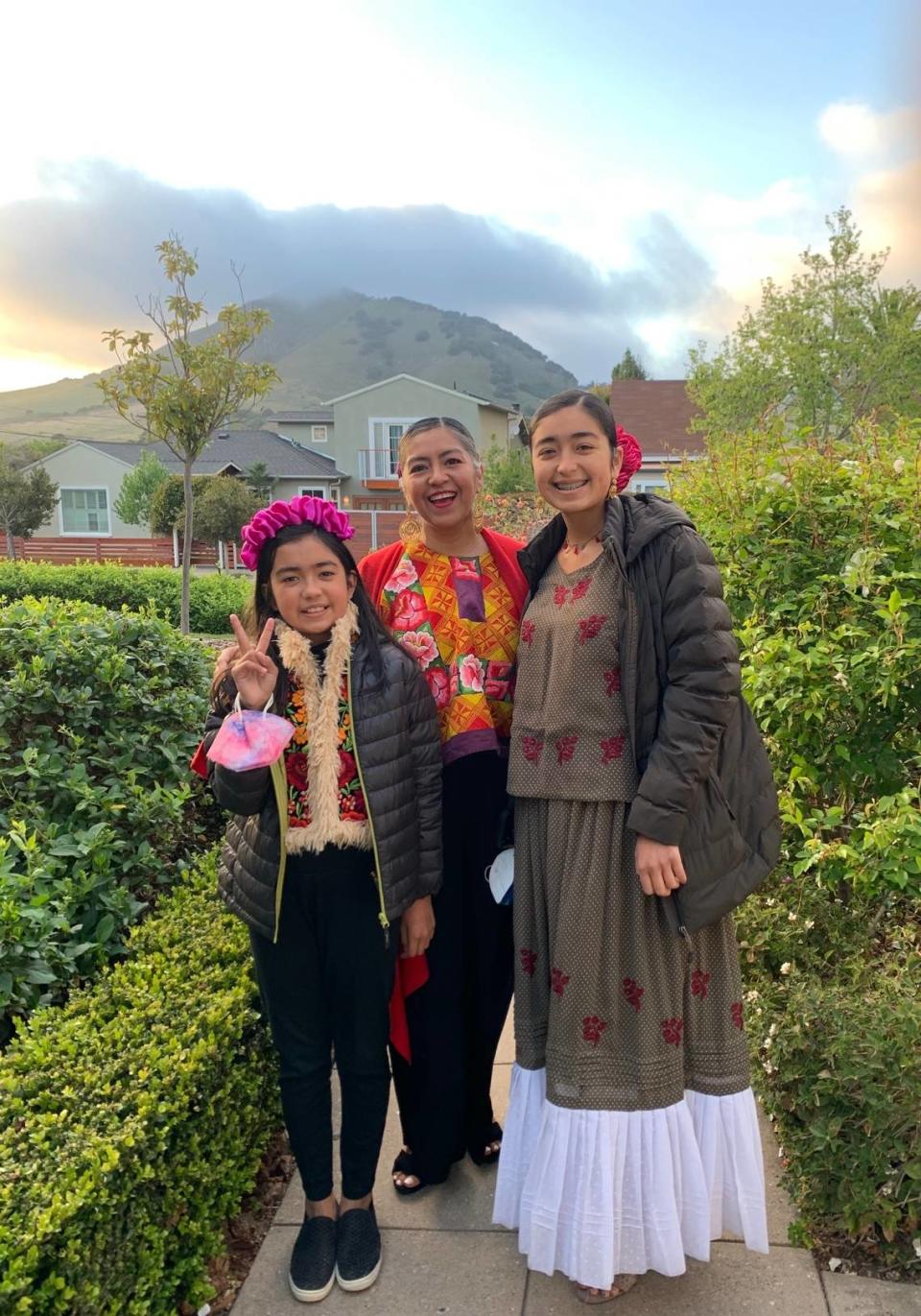How SLO mom beat breast cancer and became an advocate for Latinas: ‘I can give them hope’
Editor’s Note: San Luis Obispo business owner, breast cancer survivor and mother of two Claudia Cabrera Olsen contributed to this reporting as part of The Tribune’s Diversity Storytelling Project — where we tell stories in partnership with leaders of underrepresented communities in SLO County, in partnership with the Diversity Coalition San Luis Obispo County. Read our first installation of the storytelling project featuring Paso Robles High School graduate and LGBTQ activist Ava Hughes.
In March 2020, Claudia Cabrera Olsen and her husband Jon took the first step toward their longtime dream of opening an upscale Airbnb vacation rental and hosting travelers from around the world.
They purchased a historic home for their family of four near downtown San Luis Obispo: the Islay Manor, which was once owned by moving company magnate William Sandercock.
Then two unexpected medical diagnoses put the Olsens’ plans on hold.
“We started remodeling the home, and of course, we have to stop because my husband got sick for one year,” Claudia Olsen, 50, said.
Then, “I was diagnosed with breast cancer, so we had to stop (again),” she said. “I told Jon, ‘I don’t want to stop,’ because that’s my dream. That’s my legacy.”
Olsen started undergoing treatment for breast cancer, documenting her experiences on Instagram for her friends and family.
In doing so, she unexpectedly fell into the role of advocate and confidant for other Latina women, many of them grappling with their own health issues.
Latina and Hispanic women are more likely to be diagnosed with breast cancer at later stages because they are less likely to obtain regular mammograms, according to a 2018 report from the American Cancer Society on cancer among Hispanic and Latinos.
Part of the reason is cultural, because breast exams can be an invasive process that leaves the patient vulnerable, Olsen said.
“Now I’m telling my friends and all women: Look at yourself in the mirror every day. You say you’re beautiful, strong, powerful, kind, but look at your breasts. Look, if there’s any changes to color, shape, anything,” Olsen said.
“I think the stars align in the universe and everything happens for a reason,” Olsen told The Tribune. “Now, I believe that it was for a reason.”
What is The Tribune’s Diversity Storytelling Project?
Olsen’s story is the second installment in The Tribune’s Diversity Storytelling Project, which aims to raise the voices of underrepresented members of our community by having them share their daily experiences in their own words.
Our first storyteller, Ava Hughes, shared her experiences as a Paso Robles High School student advocating for LGBTQ+ inclusion in the wake of bias-motivated incidents against the school’s queer community in 2021.
Olsen recorded a series of voice memos in January and February outlining her daily life in San Luis Obispo.
In these reflections, which she shared with The Tribune, Olsen described meeting doctors, attending community meetings for women in business and launching a new Airbnb property.
Her experiences reflect the shortcomings of the San Luis Obispo County health care system and the emotional weight of recovering from a serious illness, as well as the vital importance of empowering Latina women to seek routine breast cancer screenings and treatment.
Some of Olsen’s reporting is included in this article.
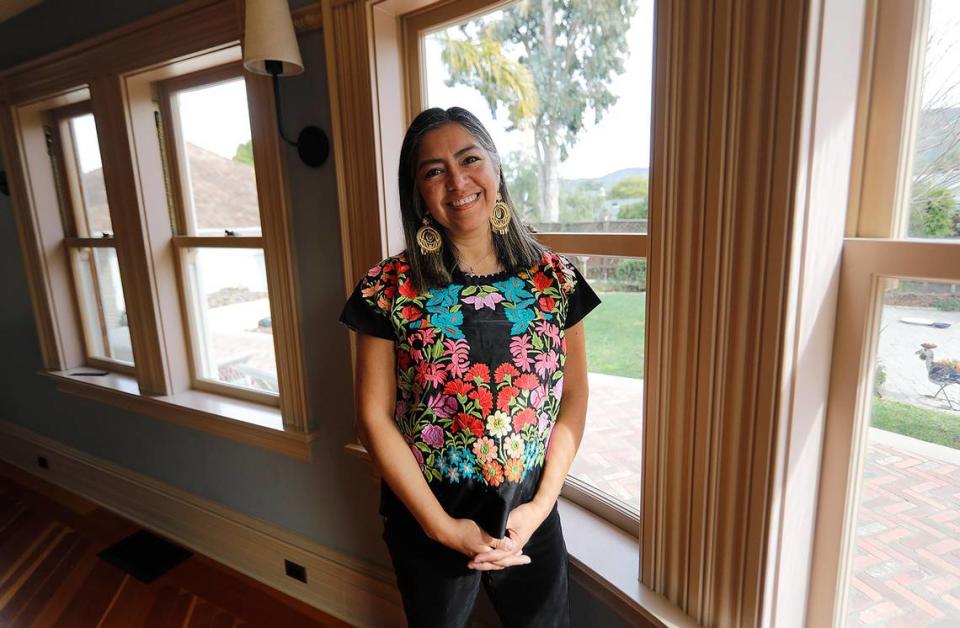
SLO woman diagnosed with breast cancer
Olsen was born in Oaxaca, Mexico. She lived there for 26 years before moving to San Luis Obispo, where she is a stay-at-home mom and active community volunteer.
Olsen met her husband more than two decades ago while working as an innkeeper at her family’s bed-and-breakfast in Oaxaca. Jon Olsen, then a teacher in Oceano, was saying at the inn.
“(It was) like those Hallmark movies,” Claudia Olsen said in a Jan. 25 voice memo. “This handsome guy comes to stay at the inn, and then meets the innkeeper and they fall in love,” she said in a Jan. 25 voice memo. “So that’s the story, but a little more complicated, because we (had) to break the barriers for the culture, religion and language.”
At first, they had to hide their courtship from their families, who were concerned about the success of a cross-cultural relationship. But the couple persevered.
One of the Olsens’ goals after getting married was to open a bed-and-breakfast in SLO County, similar to the lodgings run by Claudia Olsen’s family in Oaxaca.
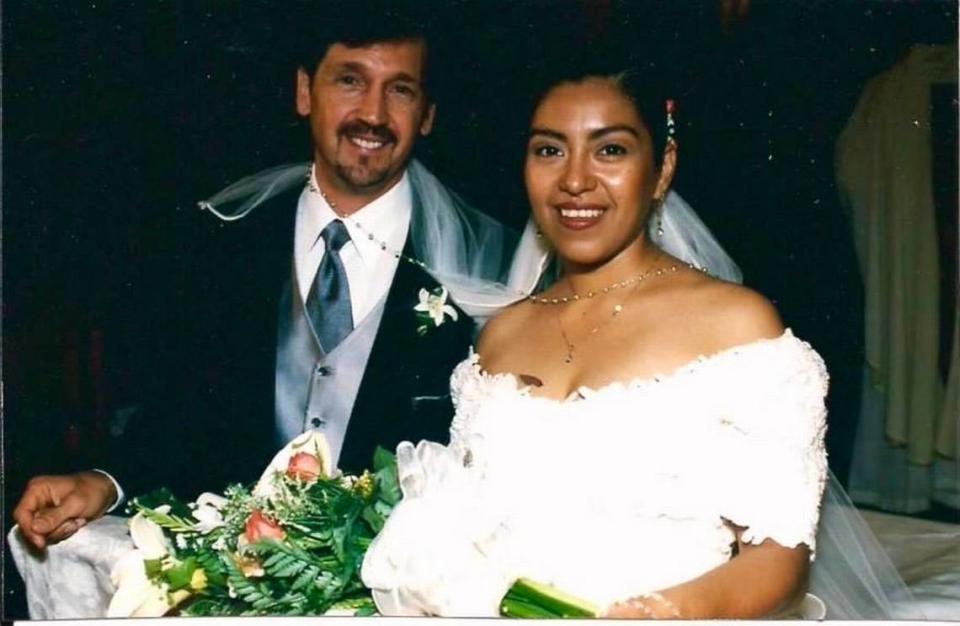
But priorities changed after tahe birth of their daughters, Aria, 16, and Cielo, 11.
Their efforts to turn part of their San Luis Obispo home into a two-bedroom, ground-floor apartment were complicated by construction delays due to the coronavirus pandemic and two health diagnoses.
In November 2021, Jon Olsen was diagnosed with Ménière’s disease, a condition in the inner ear that causes severe vertigo.
A few months later, in February 2022, Claudia Olsen went in for a routine mammogram at Selma Carlson Diagnostic Center in San Luis Obispo, but after the scan, she was taken into a private room.
Immediately, her anxiety spiked as doctors told her some of the results were unusual and required further investigation.
“It was a huge surprise,” Olsen said, noting that she does not have a family history of breast cancer.
The presence of calcifications in her breast meant she needed a biopsy so doctors could determine if the cells were cancerous.
That first biopsy, performed at a hospital in San Luis Obispo, was the most traumatic part of her cancer treatment, Olsen said.
“I felt like I was butchered,” Olsen said. “I was bleeding and they couldn’t stop the bleeding. And so the nurse had to jump on the table and put all her weight and her hands on my breasts.”
Shaken from the experience and facing a two-week wait before she could speak with a surgeon about her diagnosis, Olsen listened to the advice of three friends who helped connect her with doctors at Ronald Reagan UCLA Medical Center in Los Angeles.
That’s where Jon received medical treatment just a few months prior, and the family felt confident Claudia would receive the best care there.
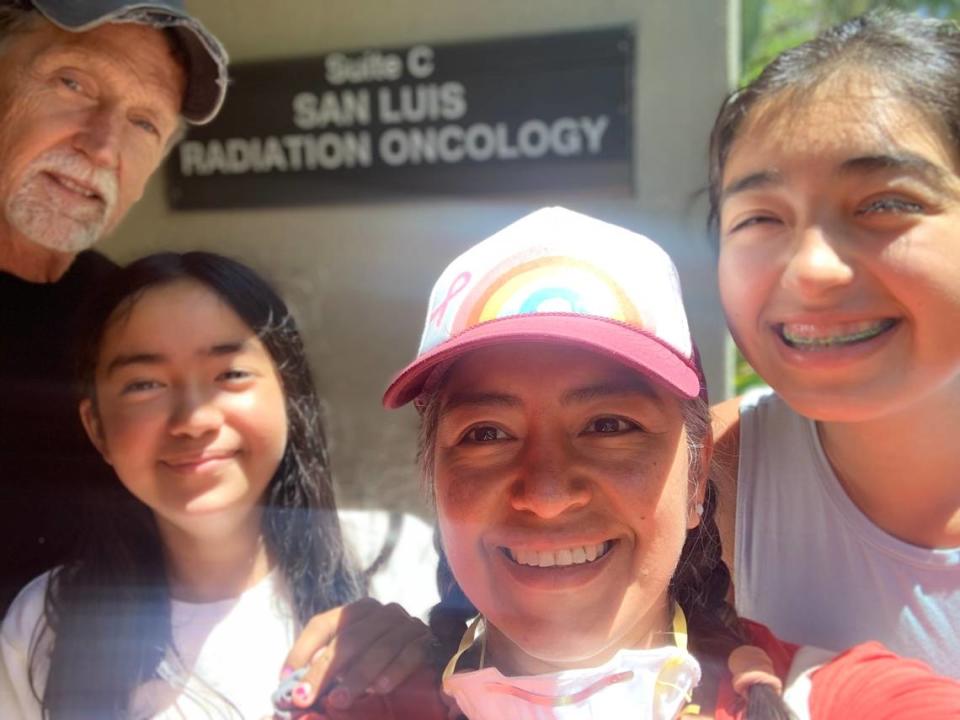
A biopsy performed at UCLA later revealed a mass in her right breast. Further MRI scans showed a nearly three-centimeter, slow-growing tumor that was missed in previous mammograms.
Olsen also wanted to go to UCLA for treatment because it is a research hospital. By donating her medical samples, she hoped, perhaps someday they could be used to find a cure for breast cancer.
“Seeking help at UCLA ... was the best decision I have ever made in my life besides marrying Jon,” Olsen said. “The help that I had there through all the process, testing, biopsies and surgery … the people were so kind, so helpful.”
On April 28, 2022, Olsen had a lumpectomy on her breast to remove the cancer.
She also had to undergo six weeks of radiation, but did not require chemotherapy.
Six months later, Olsen returned to UCLA for a post-radiation MRI and mammogram to see how effective her treatment had been.
After the radiologist requested additional images, she was once again taken to a private room to talk with the doctor.
“This is when I lost it!” Olsen wrote in an Instagram post. “In a matter of 2 seconds I felt the fear that I felt when I had my breast cancer diagnosis in February.”
There, Olsen learned she had other calcifications in the same breast where the cancer was detected.
“I share my story because I don’t want any of you to be afraid when they take you to a private room with the doctor to discuss your test results,” she wrote on the post.
Shortly after that appointment, she received the good news that the cancerous tumor was successfully removed and no additional cancer was detected.
The calcifications, however, unresolved, however.
One radiologist at UCLA suggested they follow up in a year. A second radiologist suggested six months.
But Olsen didn’t want to wait that long. She told her surgeon her concerns and scheduled a biopsy on the calcifications in March.
The results of the latest biopsy came in on March 22: Olsen is officially cancer-free.
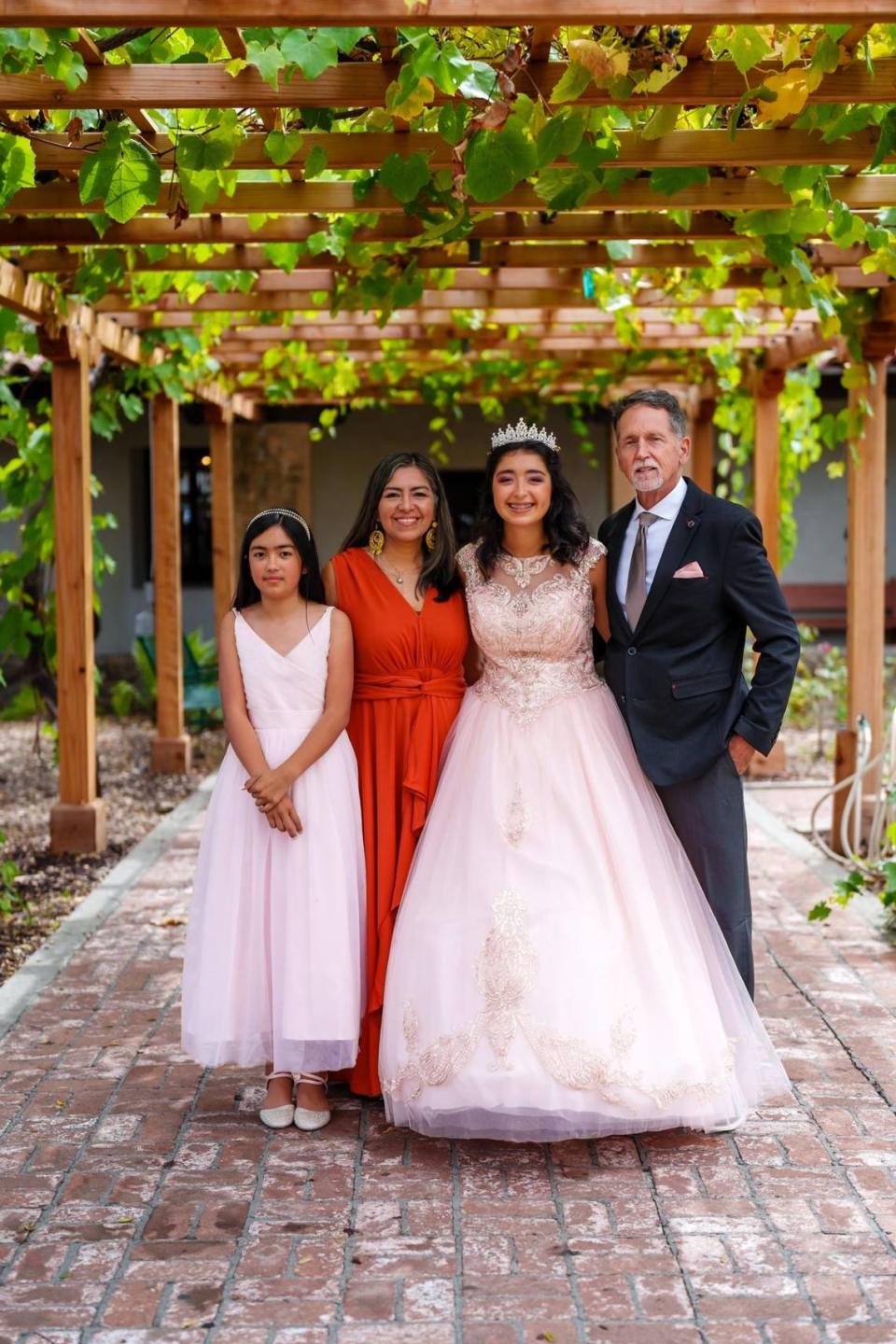
Patient turns to social media for advocacy, connection
After receiving her breast cancer diagnosis, Olsen started posting about her experiences on Instagram and Facebook.
Her followers include many friends and family from the United States and Mexico, she said.
The experience of sharing her story was empowering and allowed Olsen to build connections with women and families, many of them Latina. Some of the friends she spoke with told her they were hesitant to get cancer screenings or were facing cancer diagnoses and trying to navigate the complex U.S. healthcare system.
After Olsen shared her cancer diagnosis on Instagram, she said, “All my friends, especially my Mexican friends, ran to have their first mammogram done.”
Some friends called Olsen for advice, referrals or even to see if she’d speak to others about her experience, she said.
Other times, she said, people she’s never met would call on behalf of women battling with breast cancer and ask “Could you help her?”
“That’s when I realized that I have to step out of my comfort zone and do these types of things — interviews or advocacy,” Olsen said. “When (people) talk to me, I can give them hope, or at least they can lower the level of anxiety when they know there’s someone that has gone through this.”
Now, Olsen will be featured in a March episode of the podcast “Women Making Waves,” hosted by Tyler Skinner, to talk about her breast cancer advocacy.
One of the key pieces of advice Olsen offers to everyone who reaches out to her is to go to UCLA, Stanford University, UC San Francisco or another academic medical center for diagnostics and treatment.
Her advocacy has also taken on a more personal aspect as she shows up to support friends and family.
She accompanied her friend, who was also diagnosed with breast canser and asked to be identified only as Leanne to protect her privacy, to her final radiation appointment on Jan. 26.
“She looked great. She was very happy. She looks strong. She used cold caps and she didn’t lose all her hair,” Olsen said in a voice memo recorded for the Diversity Storytelling Project.
After the appointment, Olsen and Leanne went for tea, and they reflected on how breast cancer changed their lives.
“It was a very special moment, and I feel honored that I went with her,” she said.
Community support vital to breast cancer recovery
Olsen understands firsthand the power of community in the face of daunting health challenges.
When she was diagnosed with cancer in February 2022, her mother and two of her five older siblings traveled to San Luis Obispo to support her at various times throughout her treatment.
One older sister, Pilar Cabrera Arroyo, a renowned chef in Oaxaca, came to San Luis Obispo to support Olsen during her first biopsy. She stayed for four days and filled her freezer with some of her favorite meals.
Another sister, Ita Rodriguez, who lives in New Jersey, traveled to San Luis Obispo to be with Olsen shortly after her diagnosis and again during her surgery.
“I have heard from some cancer patients that sometimes it’s very lonely or you feel everyone is busy,” Olsen said. “I had those feelings, but they weren’t often because I feel the support of my friends and, of course, meditation. I’m praying and meditating, that is something that took me to a level where I was at peace.”
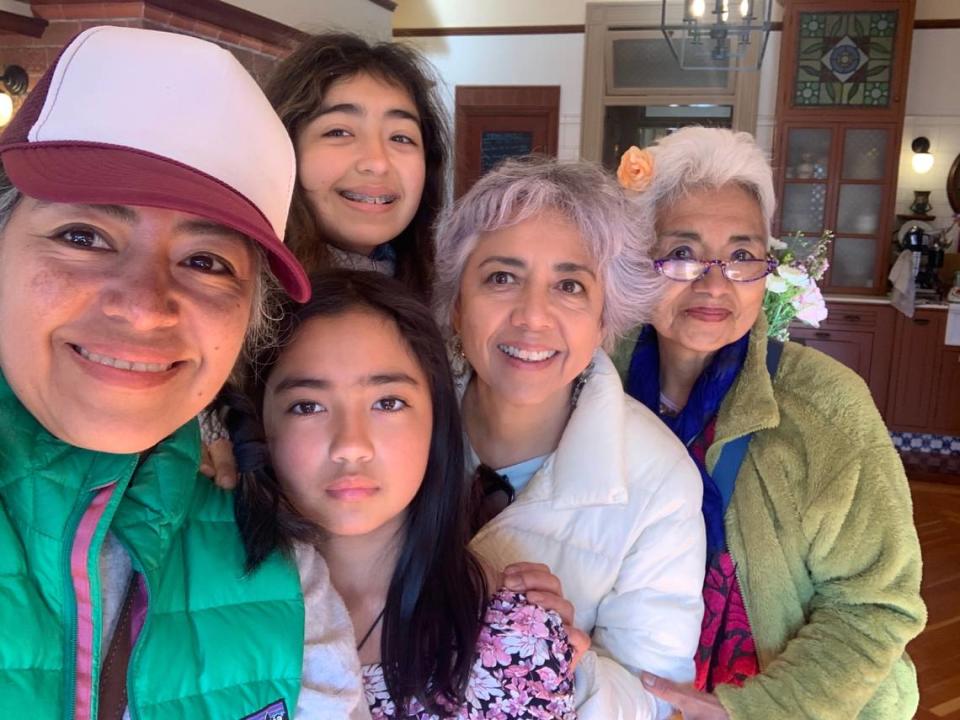
Other help came from newfound friends.
One of Olsen’s Instagram friends offered to accompany Olsen to her March biopsy, despite the pair never having met in-person.
Sara Kidb, a woman who sells microgreens at the San Luis Obispo Farmers Market, insisted on giving Olsen greens and vegetables free of charge when she learned she was eating the produce to help with her fight against cancer.
Kidb also offered a discounted price to other cancer patients.
San Luis Obispo hairstylist Melanie Mulvaney offered to wash and style Olsen’s hair after her lumpectomy, when she was unable to raise her arms above her head to cleanse her scalp herself.
“I hope that I can give what I’m receiving in support to other people. That’s my goal,” Olsen said. “For me it is something easy and it comes from my heart.”
Paso Robles organization aims to empower Latina women
Research shows Latina women such as Olsen face numerous barriers when it comes to accessing equitable treatment and screenings for breast cancer.
According to the American Cancer Society, one in 10 Hispanic women will develop breast cancer, and it’s the most common type of cancer among Latina women.
It’s also the leading cancer-related cause of death among Hispanic women, according to a report by the Cancer Society.
Although the rates of breast cancer among Hispanic women are lower than those among white and other non-Hispanic women, Hispanic women are more likely to be diagnosed with breast cancer at a later stage, the report said, in part because fewer get mammograms.
Olsen learned more about the health disparities in breast cancer screenings and treatment among Latina women when she got involved with the San Luis Obispo County-based group Mujeres de Acción (Women of Action).
The group focuses on health advocacy for Latina women in SLO County and provides support such as meals for families whose loved ones are going through breast cancer.
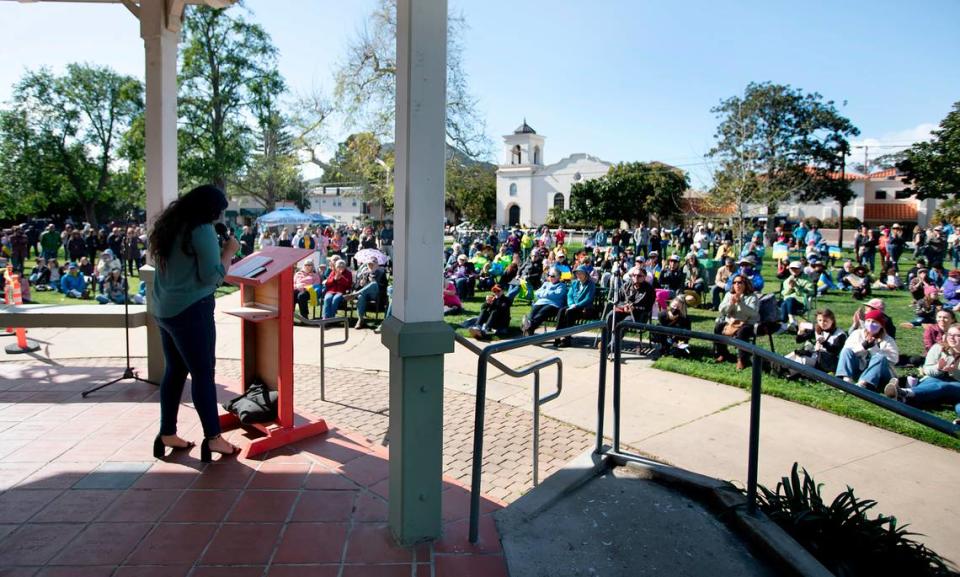
Paso Robles activist Yessenia Echevarria started the group in 2014 after her mother was diagnosed with breast cancer.
As she accompanied her mother to doctor appointments in SLO County, Echevarria witnessed the barriers that prevent Hispanic women from accessing necessary healthcare services.
“We came to learn that breast cancer is still a big, taboo topic,” Echevarria told The Tribune. “It’s a lot of ‘I don’t want to talk about it.’ It can also bring a lot of shame.”
Culturally, many Latina and Hispanic women are unaccustomed to doing breast self-exams or prioritizing their health needs, Echevarria said.
“In our culture, we’re not used to touching our bodies,” she said. “Even having a physical once a year seems a bit of a luxury, especially when we talk about women who may not have documented status.”
Often, she said, women are “taking care of everybody else but themselves.”
In October 2022, Olsen was invited to speak at Mujeres de Acción’s annual fundraiser in Paso Robles, held during Breast Cancer Awareness Month.
Echevarria said the testimony from survivors such as Olsen is one of the most valuable components of Mujeres de Acción, and it leaves attendees feeling empowered to get their annual mammogram.
“Claudia was a magnificent person to have shared (her experiences) because she is a mother,” Echevarria said. “She is pretty young in my eyes, and (that drives home) the reality of recognizing that it can happen to anyone.”
“She was really instrumental in sharing that message of ‘Even once you get diagnosed, this is what the journey is like,” Echevarria said of Olsen. “It’s been amazing to see her also take ownership of her story and to be able to impact so many other women as well.”
Olsen said Mujeres de Acción’s mission to support Latina women, many of them recent immigrants, impacted her tremendously.
“How thoughtful and amazing (it is) that women are supporting these families in need as they’re going through cancer treatments,” she said.
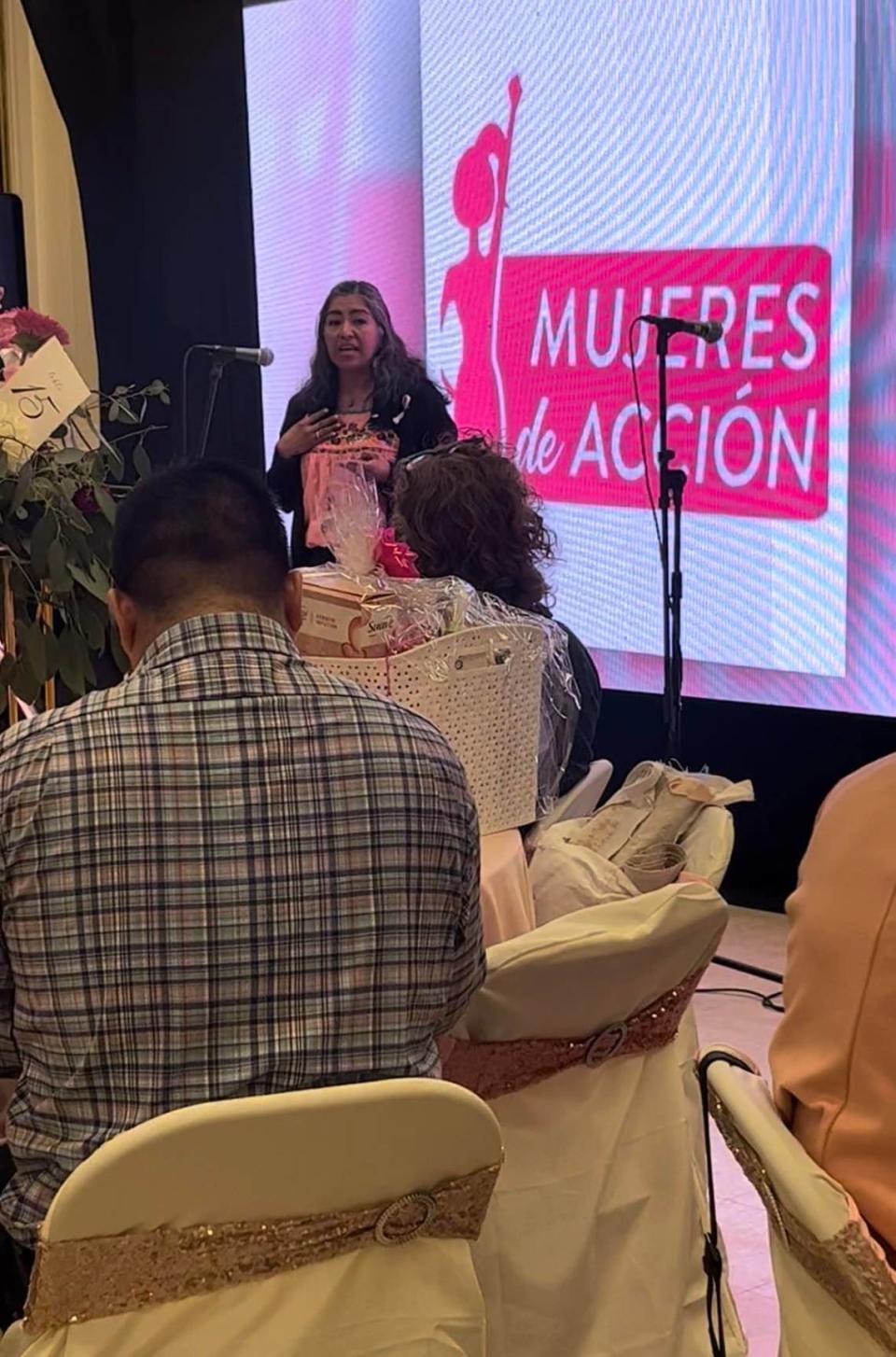
Helping Latinas friends navigate cancer, health challenges
According to Olsen, many of her Latina friends grappling with health challenges have struggled to maneuver the U.S. healthcare system and at times hesitated to get specialized medical care.
“I have heard these horror stories of women having surgeries that were unnecessary,” she said. “You need to be your own advocate. And also, I’m advocating for other people.”
Olsen recalled how one of her friends, who she described as her Oaxacan sister, had uterine fibroids that were so pronounced that she experienced severe bleeding over the course of a year, leaving her anemic and highly vulnerable.
Her friend, who asked to be identified as Gabriela to protect her privacy, didn’t have insurance at the time and was hesitant to access costly and complex healthcare services.
Gabriela went to a Community Health Centers of the Central Coast clinic in San Luis Obispo, where a doctor told her that the only way to determine what sort of treatment was necessary was to have surgery, and the surgeon would decide while she was on the operating table.
Olsen told Gabriela she needed a second opinion.
“Look, we’re Mexicans, (so) we believe everything that the doctors tell us,” Olsen said. “Now I’ve learned if you have an answer that ‘It’s easy,’ don’t just accept that. Look for something else.”
Olsen also advises bringing a notebook to write down questions ahead of time and document the doctor’s findings.
Echevarria explained that challenging authority figures runs counter to many Latinas’ upbringing.
As an example, Echevarria shared the story of a local woman with a family history of breast cancer who had to physically move a doctor’s hand to her breast to feel a potentially cancerous lump after he told her that an initial exam didn’t detect any abnormalities.
“The doctors are not God. They don’t know everything,” Olsen added.
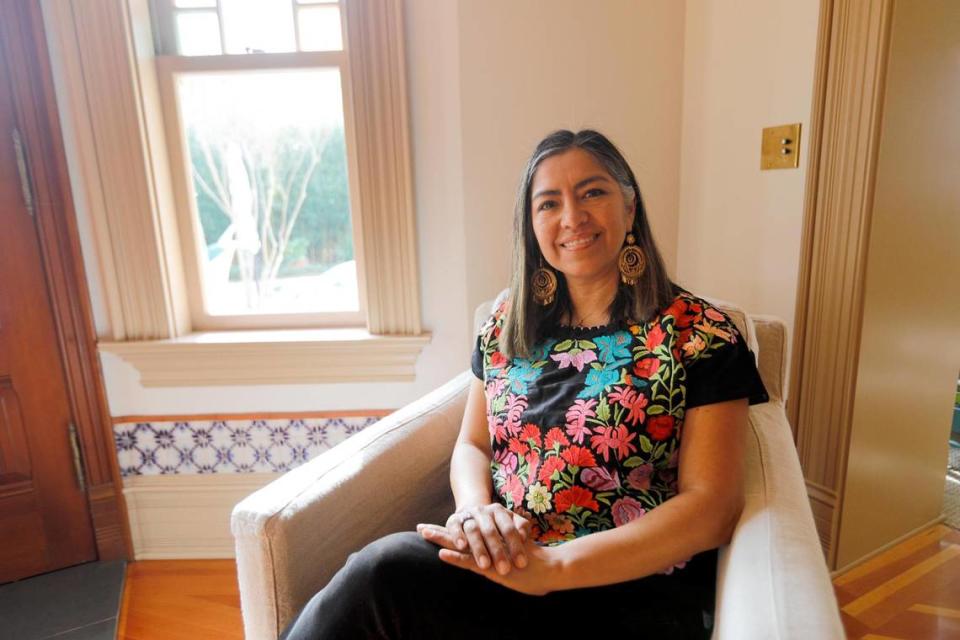
Gabriela originally planned to obtain health insurance and eventually go to UCLA for an appointment. Then, while at a gathering of family and friends, she started bleeding again.
Olsen pulled Gabriela and her husband aside and insisted they drive to Los Angeles for an emergency appointment.
When her friend expressed concerns about the cost of such treatment, Olsen replied, “I don’t care. We will do a GoFundMe (fundraiser). We will sell cookies. We will do whatever, but you need to be seen. We don’t want you to die.”
At UCLA, doctors were able to stabilize Gabriela’s bleeding, while a social worker provided emergency Medi-Cal coverage.
Later, Olsen found a physician who was able to conduct laparoscopic surgery on Gabriela’s uterine fibroids without removing her uterus entirely.
“It was a very difficult time, especially the last year before the surgery,” Gabriela said. “I didn’t have an answer and I was really hopeless.”
Gabriela is now in good health, and working to get healthcare coverage for her family.
She hopes her story helps other women who may be trying to navigate the healthcare system or who are struggling with serious health problems without health insurance.
“There’s no help for people in my situation,” Gabriela said.
SLO County family opens Airbnb after delays
After two years of navigating health challenges, the Olsen family came one step closer to fulfilling their decades-long dream of opening a bed-and-breakfast in San Luis Obispo.
But a new health concern threatened to throw a wrench in their plans.
In January, roughly six months into her recovery from breast cancer, Claudia Olsen found herself in yet another doctor’s office.
Her endocrinologist warned her blood sugar levels were elevated, meaning she was at risk for developing Type 2 diabetes.
“I feel that I’m falling apart with all these health issues,” Olsen said in a Jan. 17 voice memo. “I felt that nothing that I’m doing is changing my health. I left the doctor’s office crying.”
Olsen wasn’t at the appointment alone. Her husband was there with her to anchor her, ask questions and provide a second set of ears.
“You need to go with someone,” she said in the voice memo. “Sometimes when you are under stress, you don’t understand or you see things differently. So that was super helpful for me.”
The following morning, she and her husband decided to join a gym and started working out almost every day.
“It brought back so many good memories” of when she and her husband first started dating, Olsen said.
Then they’d spend hours together in the gym, ”That’s how we fell in love. He says that for him it was love at first sight,” she said.
Olsen and her husband, who celebrated their 24th wedding anniversary in January, also persevered with their plans to open their AirBnB.
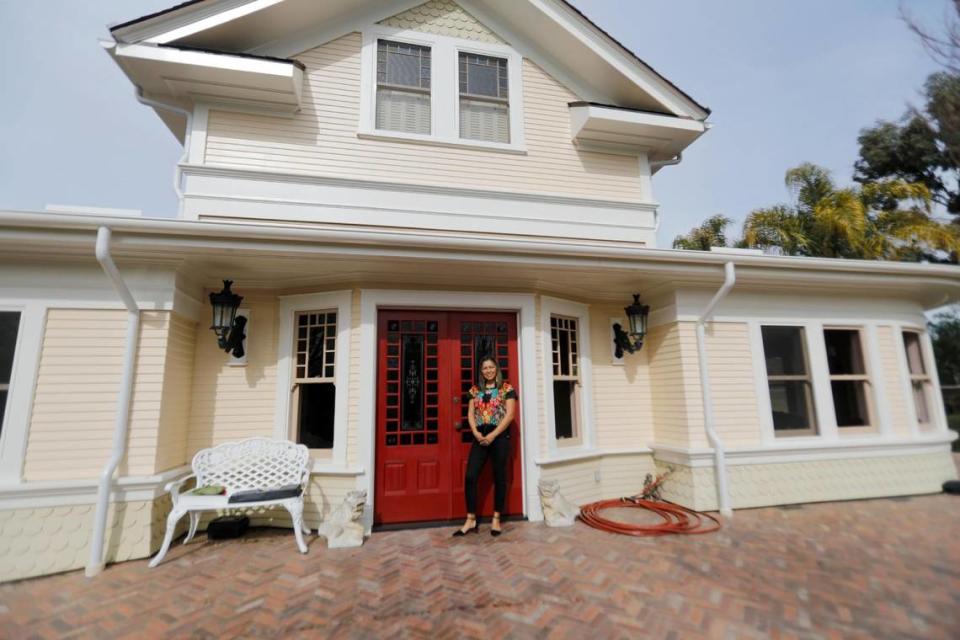
“When there’s hardship, I turn into warrior mode,” she said.
On Jan. 12, the Olsens’ listing went live on Airbnb for the first time. At first, reservations didn’t roll in as quickly as they had hoped.
“That was very discouraging,” Olsen said in her Jan. 12 voice memo. “I was a little depressed, because we have put so much love, sweat and tears into the project.”
Just a week later, the Olsens received their first reservation on Airbnb.
“I feel great. The rest of the calendar is empty, but we have at least one,” Claudia Olsen said in a Jan. 19 voice memo.
The next day, Olsen attended a luncheon for women investing in real estate.
“It’s out of my comfort zone to be among all these women that are in real estate investing,” she said in a Jan. 20 voice memo. “It’s not me.”
The keynote speaker at the real estate investing lunch was Norma Rapko, a Mexican American woman who patented a one-of-a-kind craft pen and started her own business.
After attending the mixer, Olsen connected with Rapko and made plans to meet up.
On Jan. 26, Olsen, Rapko and Gabriela spent nearly four hours at an Avila Beach coffee shop, sharing stories about their lives.
“It was so uplifting to hear from someone that could understand both sides of the culture,” Olsen said, “living here in the United States and then becoming a powerful influencer and inventor in the United States.”
Before participating in The Tribune Diversity Storytelling Project, Olsen said she didn’t keep a journal or think much about her day-to-day life.
“I never thought that my life was filled with so many things that make it so interesting,” she said.
“That’s something that was super important for me to realize,” she said. “(The Diversity Storytelling Project) helped me see how important I am — and the things I do and the decisions I have to make every day or the impact that my actions are having every day with the community, friends, husband, kids.”
The Tribune is looking for people who are part of underrepresented communities to help us take a closer look at life in San Luis Obispo County. If you or someone you know might be interested in partnering with The Tribune in the Diversity Storytelling Project, please contact reporters Sara Kassabian (skassabian@thetribunenews.com) or Kaytlyn Leslie (kleslie@thetribunenews.com).
